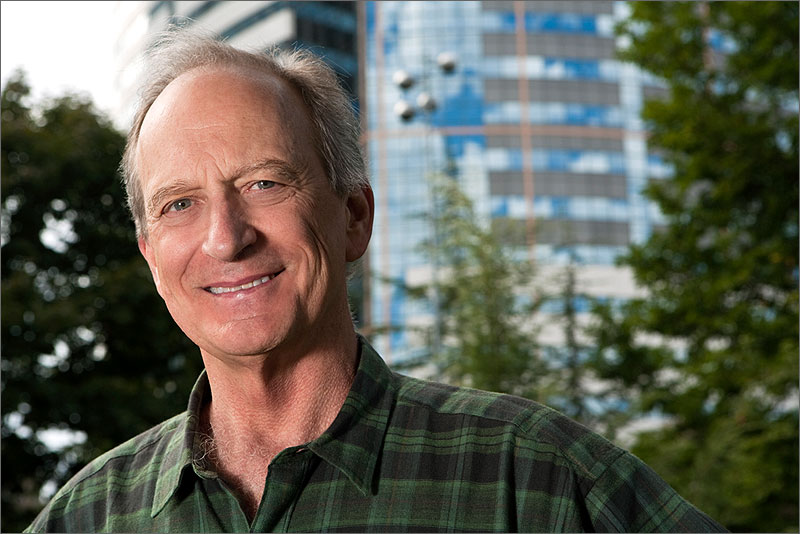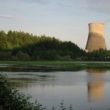In 1969, Gaylord Nelson, seven years out of the U.S. Senate, called on Denis Hayes to organize what Nelson envisioned as a national teach-in on the environment. The result was the first Earth Day, conceived of by the former Democratic senator and realized by Hayes and a staff of 85.
Today Hayes is head of the Bullitt Foundation, a Seattle-based non-profit that promotes environmentally sustainable projects and communities in the Pacific Northwest. I met with Hayes in the foundation offices on the sixth-floor of the Bullitt Center.
(The building, which officially opened on Earth Day 2013, is a form and function demonstration of what the foundation is about. A cap that seems to float above the roof is covered with photovoltaic panels that produce 230,000 kilowatt-hours a year, enough electricity for all the tenants in the 50,000-square-foot building. Ten-foot-tall, triple-pane windows (that can be opened) “harvest” sunlight. Rainwater captured and stored in a 56,000-gallon underground cistern is filtered and used as potable and non-potable water. The Bullitt Center is an experiment in carbon-neutral environmental sustainability. And it’s an architectural gem—filled with natural light, softened by the extensive use of exposed wood, and engaging the neighborhood through a mostly glass exterior.)
I asked Hayes about the campaign against the Pacific Northwest export terminals that will ship coal mined in Wyoming’s Powder River Basin to China.
The movement is far broader, Hayes said, than 100 local, regional, and national environmental groups working in collaboration.
Hayes: “There is something about the idea of sending coal abroad to be burned in ways that will harm the planet in our lives, our children’s lives, the lives of our great-great grandchildren, that just deeply affects across a broad cross section of the population.”
“The Seattle Chamber of Commerce left the U.S. Chamber of Commerce because of the latter’s position on climate denial,” Hayes said. “I don’t know whether they have taken a position on the terminals, but I’m sure there is no enthusiasm for trains running with regularity through downtown, carrying coal for export.”
Seattle Mayor Mike McGinn is a declared opponent.
“He won his race on an environmental issue, a tunnel going through Seattle,” Hayes said. “He came into office clearly standing for something, and his constituents understand that.”
Hayes completed my sentence when I asked if Washington Governor Jay Inslee was “one of best, if not the best pro-environment governors…”
“Ever elected,” he said.
Inslee is like Ronald Reagan, Hayes said, in the sense that he was “clearly standing for something” when he ran for office:
“Environmental values, the climate issue, certainly renewable resources, energy efficiency and green jobs. Jay Inslee came into office with a mandate.”
When the Washington Department of Ecology decided to conduct a broad environmental assessment of the export terminals, Hayes speculated, it was because those values permeate the Inslee administration.
Oregon Governor John Kitzhaber and California Governor Jerry Brown also oppose the export terminals.
“On this issue, with those governors, it’s going to be difficult to turn the West Coast into something that looks like the great carbon-exporting axis of the world,” Hayes said.
The three Democratic governors are only part of a regional political ecosystem unique in this country.
“Where the environmental movement is important, where you feel the passion, is among the people at the grassroots,” Hayes told me. “There is something about the idea of sending coal abroad to be burned in ways that will harm the planet in our lives, our children’s lives, the lives of our great-great grandchildren, that just deeply affects across a broad cross section of the population.”
If there is a backlash, over Obamacare or another issue, and Inslee is defeated, the movement that helped elect him is not going away.
“I think that in Seattle and Portland, and to a somewhat lesser extent in Spokane,” Hayes said, “you could see platoons from the community, literally going down and lying in front of the construction projects week after week.”
“There is a genuine, deep-seated hostility toward these projects here.”
Lou Dubose is the editor of The Washington Spectator.






0 Comments